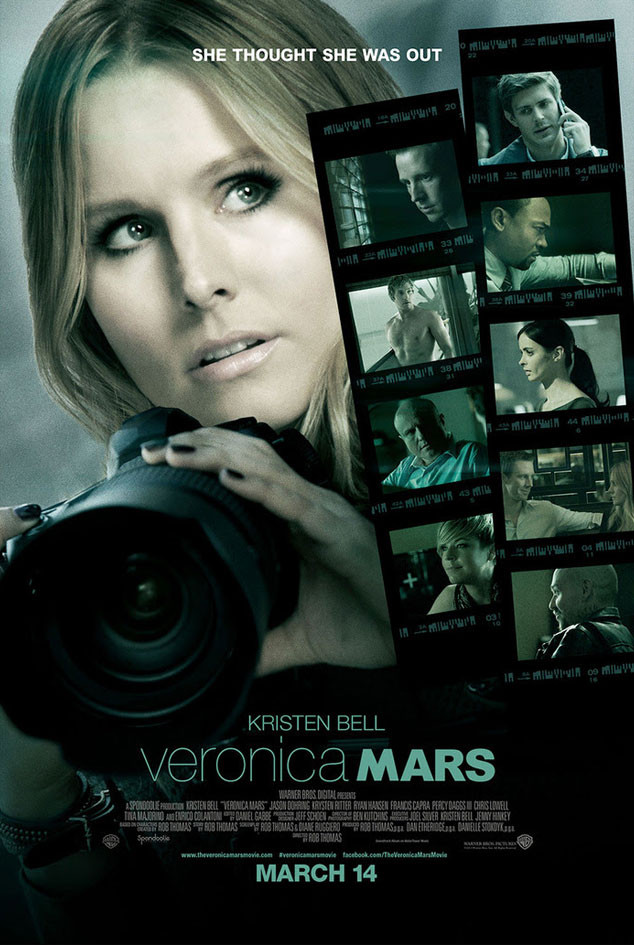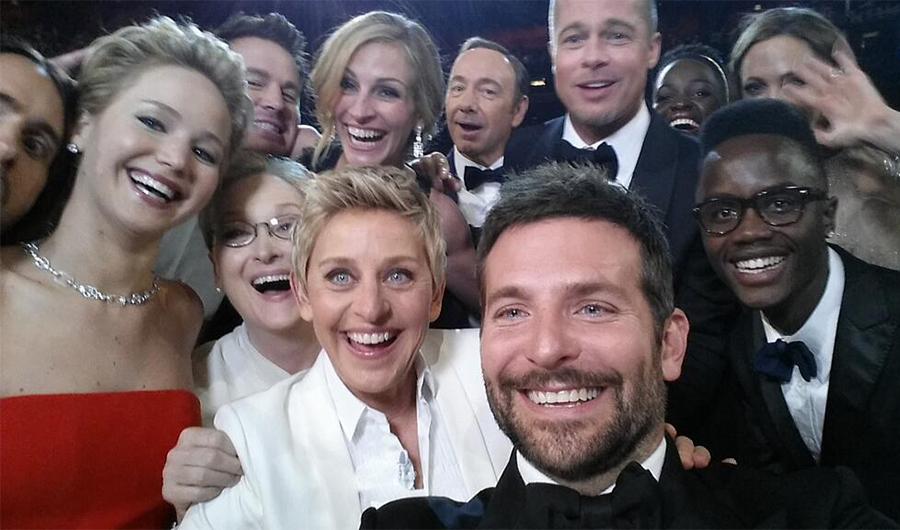TSR Blog: Cameos for Sale, TMZ, and More: How 'Veronica Mars' Investigates Film in 2014
 The zeitgeist within Veronica Mars' resurrection as a major motion picture reflects directly onto film's current state. Fans may delight in the sleuthing shenanigans that abound in co-writer/director Rob Thomas' Veronica Mars, replete with its billion cameos and its seance-like atmosphere. But as an outsider to Mars' world of Neptune, CA, I was struck more by the film's observance on the forces that are currently shaping movies, for better or for worse. Considering its existence as a crowdfunding success, its endorsement of product placement, its interest in celebrity journalism, and its feature presentation as a TV movie, Veronica Mars approximately defines the current state of our creation, and consumption, of cinema as popular entertainment. When gauging the project's relevancy to modern film, one must talk about its background as a Kickstarter movie. Veronica Mars is one of the first major film projects out the gate to show the world what happens when 91,585 people band together to help Hollywood people make a movie. The battle of whether celebrities should be able to fund through Kickstarter now becomes more complicated. After director Spike Lee received flack for utilizing Kickstarter to fund his upcoming film Da Blood of Jesus, Kickstarter responded in August 2013 by reasoning that $21 million has been raised for smaller projects since the efforts of Lee and writer/director Zach Braff. But just recently at SXSW, where Veronica Mars premiered, producer Dana Brunetti criticized these Kickstarters were taking away from "the little guy" (oddly enough at an indie film festival that featured director Marc Webb talking about The Amazing Spider-Man 2).
The zeitgeist within Veronica Mars' resurrection as a major motion picture reflects directly onto film's current state. Fans may delight in the sleuthing shenanigans that abound in co-writer/director Rob Thomas' Veronica Mars, replete with its billion cameos and its seance-like atmosphere. But as an outsider to Mars' world of Neptune, CA, I was struck more by the film's observance on the forces that are currently shaping movies, for better or for worse. Considering its existence as a crowdfunding success, its endorsement of product placement, its interest in celebrity journalism, and its feature presentation as a TV movie, Veronica Mars approximately defines the current state of our creation, and consumption, of cinema as popular entertainment. When gauging the project's relevancy to modern film, one must talk about its background as a Kickstarter movie. Veronica Mars is one of the first major film projects out the gate to show the world what happens when 91,585 people band together to help Hollywood people make a movie. The battle of whether celebrities should be able to fund through Kickstarter now becomes more complicated. After director Spike Lee received flack for utilizing Kickstarter to fund his upcoming film Da Blood of Jesus, Kickstarter responded in August 2013 by reasoning that $21 million has been raised for smaller projects since the efforts of Lee and writer/director Zach Braff. But just recently at SXSW, where Veronica Mars premiered, producer Dana Brunetti criticized these Kickstarters were taking away from "the little guy" (oddly enough at an indie film festival that featured director Marc Webb talking about The Amazing Spider-Man 2).
With expectancy that Veronica Mars will be an overall success on a $5-6 million budget and a dual VOD & limited theatrical release, the film marks a tipping point for the integrity of crowd-funding. If producers of other dormant cult franchises listen to money like Hollywood barons do, Veronica Mars could accelerate the cause of bringing other properties back to life; the capitalistic cycle of highly lucrative geek culture churning even more aggressively. In optimism, one can recognize that Kickstarters may allow singular projects and franchises to more immediately service their niche, where the goal of wipe appeal is a rare secondary thought, if not even a consideration (something that Veronica Mars endorses). The downside is that the definition of a warranted Kickstarter project could devolve to filmmakers simply successfully arguing they need the handout, convincingly playing the character of Brunetti's "little guy". Even then, those donors who receive specific goodies are only paying for the existence of a project, not ensuring its quality. Nor are they actually investing in a project, like those who won't see refunds for contributing to Braff's Wish I Was Here, which has been picked up by Focus Features.
The slippery integrity of putting a price on fan fare looms over Veronica Mars when encountering the film's second element of investigation, discourteous product placement. According to the Veronica Mars Kickstarter page, one fan handed over $10,000 to the Veronica Mars Kickstarter for an opportunity to play a waiter and say "Your check, sir." Even with this offer, and numerous other cameos in the film, the film's loudest cameo comes from Samsung products, with Ellen DeGeneres' own star-filled selfie & Samsung shilling at the Oscars still fresh in our rear-view and retweets. In Veronica Mars, the usage is more explicit: instead of the propeller for a cutesy moment, a Samsung tablet is a central device in the murder mystery. It even has indirect endorsement from MTV Movie Award stars, including James Franco playing James Franco.
 Thankfully, the logistics behind the film's Samsung utilization do check out. But with its amount of screentime, which is much more glaring than an obvious soda label shown by Jason Dohring's Logan Echolls character earlier in the film, Veronica Mars offers an ugly reminder of the damage product placement can do to films, or even film ceremonies, when supposedly vitalizing them. For a movie that is so self-conscious about itself through dialogue (even Kickstarter gets a reference), Veronica Mars expresses no awareness about its egregious resignation to turn a dramatic moment into a HuluPlus commercial interlude. It is manipulative, especially for a project that was originally conceived with the goal of a humble $2 million, and used Kickstarter simultaneously as a way to prove homemade roots as a fan-fueled project.
Thankfully, the logistics behind the film's Samsung utilization do check out. But with its amount of screentime, which is much more glaring than an obvious soda label shown by Jason Dohring's Logan Echolls character earlier in the film, Veronica Mars offers an ugly reminder of the damage product placement can do to films, or even film ceremonies, when supposedly vitalizing them. For a movie that is so self-conscious about itself through dialogue (even Kickstarter gets a reference), Veronica Mars expresses no awareness about its egregious resignation to turn a dramatic moment into a HuluPlus commercial interlude. It is manipulative, especially for a project that was originally conceived with the goal of a humble $2 million, and used Kickstarter simultaneously as a way to prove homemade roots as a fan-fueled project.
The use of Samsung products in Veronica Mars to violate personal space is then reflected in another element of the movie's observation on modern film, that with our fixation on actors as celebrities first. The smog of celebrity journalism has always been around since teen beat mags were cooing about a young Jimmy Stewart (critiquing every film with at least three stars), but in the age of click-bait it has become as toxic as it is breezy. Veronica Mars references this in a few occasions: when the film quotes its events of a singer's murder with news reactions, the movie makes a specific choice to eschew actual journalism, and instead show a clip from "TMZ on TV" (with trash-picking producers Harvey Levin and Charles Latibeaudiere appearing as themselves). This continues a point made by a prospective lawyer (played by Eddie Jemison) for murder suspect Logan, who urges that the court of public opinion is the only one that matters. This is then echoed by Jerry O'Connell's Sheriff Dan Lamb, when he refuses to seriously investigate because he understands the public has decided Logan's verdict.
When witnessing this in Veronica Mars, I was struck by how much this emulated my own angst against, of all things, casually glancing at my IMDb phone app. With acknowledgment to the idea that news sources need to feed their writers, it is an albeit disappointing turn of events that forums to discuss movies are now tampered by the mentality of red carpet fluff. In a symbolic example, this can be witnessed by a simple look at IMDb, where the section for "Top News" is not strictly populated by blurbs about the business and creation of media. Underneath a notice about a possible film project is an article about a inconsequential detail in a performer's life, converting the Internet Movie Database into an aggregator for gossip of all types, welcoming non-movie buzz from E! Online or People.com as much as it does Variety. (There is little to wonder then about James Franco's involvement in Veronica Mars, who took this as yet another opportunity to play with his image in the eyes of the increasingly perverted public opinion.)
In this regard, Dohring's Logan Echolls character no longer exists as a regular citizen, but is a celebrity news topic, all despite his own lack of creating art. With all of this considered, perhaps the most disastrous aspect is his helplessness to control his image, especially in a society that clings to the hunger it has for sensationalism, and thus romanticizes the drama of their starlets.
And lastly, as Scott Tobias of The Dissolve has defined this TV movie for the silver screen as a "thingamabob", there is the significance for what this Veronica Mars movie means in the age of "Girls" getting coverage on a website with the word "film" in its title, or "True Detective" likely having direct influence on Matthew McConaughey's Oscar campaign. A possible pioneer for more projects of similar backstories, Veronica Mars is an offspring of the incestuous relationship of TV to film, where it's not just TV becoming movies, it is also movies becoming more like TV. More directly, the images of TV and film are meeting at the halfway point of HD. In this regard, the images of TV are getting sharper, while home and theatrical viewing experiences share the concept of watching digital (and downloaded) images albeit on different size screens. Feeding into cynicism about investing time and money at the movies, the rhetorical question is weakened about what movie theaters offer that home theaters can't. The advantage previously involved more than just the promise of a bigger screen, louder sound, and new movies. Now, even Veronica Mars was available on VOD the day of its 300-theater release, for which it was one mark off from cracking the box office top ten. The occasion of a film's release less concerns its placement into local theaters, but now that it simply becomes available to the world.
With its general existence, content, and timing, Veronica Mars is a product of what movies feel like now, especially with how the concept of a viewer interacting with a film continues to change. But with these challenging elements, Veronica Mars is only the murder mystery of a generic pop star, not of the sacred movie experience itself. Subconsciously, Veronica Mars still perpetuates modern culture's excitement for film as a paramount event. Along with small victories like the power that the name "Clint Eastwood" holds within a reference made by Veronica, the hope of the franchise since its cancellation has been to upgrade to film, not return to a TV series. For all of the shows that may be exhumed for a Kickstarted second life like Veronica Mars, their fans will continue to push for the goal that a million and one franchises have in the past: whether the properties concern Marvel comic book characters or TV teen sleuths, the biggest dream for franchise owners and their consumers will be to witness these beings alive on the largest screen possible, in a major motion picture event.
